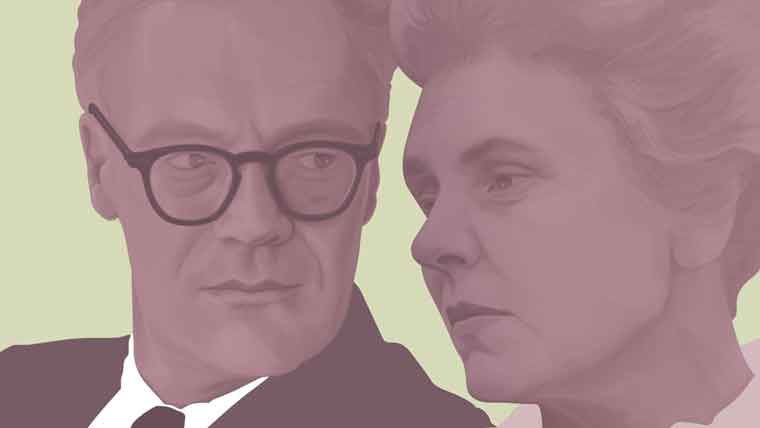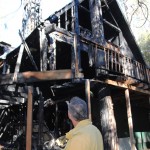
Artist Jules Julien
“Dear Elizabeth” by Sarah Ruhl is a theatrical adaptation from letters that passed between writers Elizabeth Bishop and Robert Lowell. Touted as one of the greatest exposés between two American literary giants spanning a period of 30 years, the play is culled and scripted from more than 800 letters of intricate friendship and supportive critique, replete with the inherent tensions present between two competing poets.
Pulitzer Prize recipients each, Elizabeth and Robert are the two most prominent members of the second wave of modern American poetry, the generation of poets who came of age after the groundbreaking achievements of T.S. Eliot, Marianne Moore and Wallace Stevens.
Rarely in one another’s presence from the time of their fortuitous meeting in 1947 at a dinner party, Elizabeth writes in 1962, “You have no idea, Cal,” using Robert’s nickname, “how really grateful to you I am and how fortunate I feel myself in knowing you, having you for a friend. When I think of how the world and my life would look to me if you weren’t in either of them at all — they’d look very empty, I think.”
“Idyllwild actors Gina Kraut and Christopher Morris capture the brilliance and fragile essence of these intriguing characters,” observes Stratford Players Director Marsha Kennedy. When asked about her choice of staging this play, Kennedy responded, “Many thoughts went into this choice. It’s always interesting to learn more about artistic creative people and how they summit, overcoming through art the meaningfulness of life.”
The formative lives of Elizabeth and Robert offer a vivid canvas of shared childhood loneliness. Dan Chiasson writes for The New Yorker Books, “Lowell, an unplanned and unwanted child, fathered by a meek mannered military officer, was subjected to a mother judged to be ironhanded and manipulative by standards of the time. Lowell was emotionally frail, unruly yet an altogether brilliant child.”
An early diagnosis of manic depression with waves of bi-polar instability, Robert confides to Elizabeth, “I have been sick again, and somehow even with you I shrink both from mentioning and not mentioning.” He goes on: “These things come on with a gruesome, vulgar, blasting surge of ‘enthusiasm,’ one becomes a kind of man-aping balloon in a parade — then you subside and eat bitter coffee-grounds of dullness, guilt etc.”
“The metaphors capture the illness,” writes Chiasson. “The manic self is an inflated ‘man-aping balloon in a parade’ — oversized, grotesque, dangerous. ‘Man-aping’ echoes the word ‘mania,’ while the flaccid self sits in recovery, eating morning-after ‘coffee-grounds’ of guilt. But the successful transformation of illness into metaphor is itself a sign of recovery. Lowell’s recovery letters are among the most brilliant letters ever written, for the simple reason that the writing of them operates against such tragic stakes.”
“Elizabeth Bishop,” writes Agnes Colwell, “lost her father from Bright’s disease when she was eight months old. Her mother, psychologically distraught, spent the next five years in and out of psychiatric hospitals; diagnosed as permanently insane, she never saw Elizabeth again.”
Loneliness, expedited by movement between the homes of well-meaning grandparents, was a dominate theme throughout Elizabeth’s childhood. Assuaged by her Aunt Maud’s love of literature, Elizabeth began to write poetry. “In the spring of 1934, the year her mother died and the year of her graduation, Bishop met and became friends with poet Marianne Moore. Through Moore’s influence, Bishop came to see poetry as an available, viable vocation for a woman,” writes Colwell.
“Dear Elizabeth” was met with critical acclaim after its 2012 premier at the Yale Repertory Theater. In his review, Frank Rizzo of Variety states, “Ruhl delicately explores through nothing more than the letters and her own theatrical imagination, the solitude of the artist, the exactitude of the writer’s craft, the balance between cohesion and privacy and, in the end, why poetry matters.”
Kennedy studied writing, directing and producing at the University of California Los Angeles. She also studied directing at Los Angeles’ American Film Institute, and later took classes in Readers Theater at Mt. San Jacinto College’s Murrieta campus. Her love of theater began when she read “Pygmalion” in seventh grade. “Reading that play was like opening a door. I was smitten with theater.”
She wrote, directed and produced the short films, “To Richard with Love” and “The Dragonslayer,” and founded the San Diego Screenwriters Guild. Locally, her directing debut of “Enchanted April” for the Ramona Hillside Players earned her an Inland Theater League Founders Award for directing as well as an ITL award for set design.
A subsequent play, “Cliffhanger,” earned another ITL award for set design. She also has garnered awards for short-story writing and as a playwright. In 2011, Kennedy founded Stratford Players which performs classic theater and gives a nod to the writer and dramatist William Shakespeare each September in Idyllwild by offering “Will in the Woods” on an outdoor stage.
“Dear Elizabeth” will be performed at the First Church of Christ Scientist, 25970 Cedar Street, for three performances: 2 p.m. Sunday, May 13, and 7 p.m. Saturday, May 19 and Sunday, May 20.
A Hemet performance will take place at Diamond Valley Arts Center at 7 p.m. Saturday, May 12. Tickets are available at Stratford Players.com.










